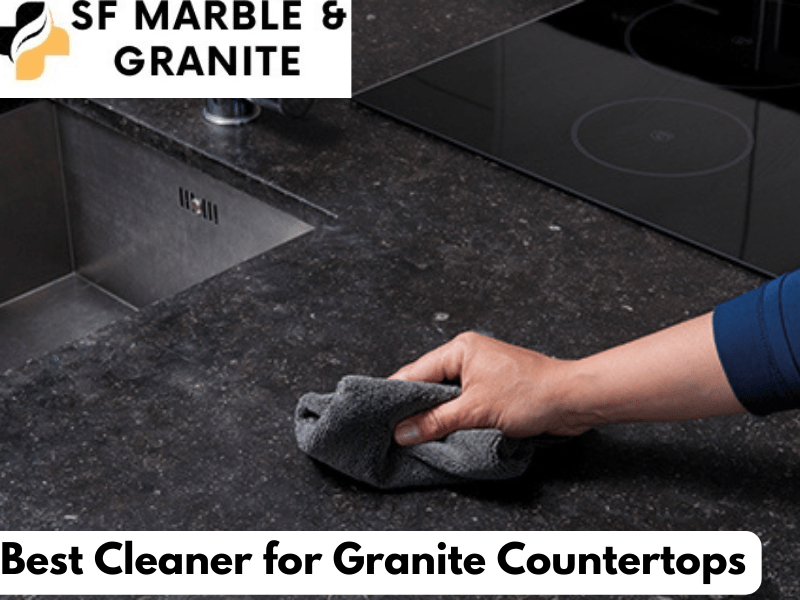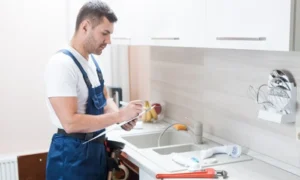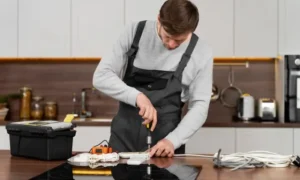Granite countertops are a timeless choice for kitchens and bathrooms, prized for their durability and...
Read MoreBest Cleaner For Granite Countertops

Though granite is very durable, there’s a long list of products that shouldn’t be used to clean it. Keep your countertops looking their best by learning the best way to clean granite. In many people’s minds, granite symbolizes strength and resilience. But if you want to know how to clean granite countertops successfully, the watchword is caution. The stone can be damaged by many of the cleaning products and techniques that are perfectly safe to use on other kitchen surfaces.
Best Cleaner for granite countertops doesn’t take special skill; the job just requires a bit of extra care and attention. Follow the steps outlined here for how to clean granite countertops, and you’re bound to be satisfied with the result of your efforts.
TOOLS & MATERIALS
• Mild dish soap
• Commercial granite cleaner
• Microfiber cloths
• Soft sponge
• Baking soda
• Hydrogen peroxide
STEP 1: Squirt Dish Soap Or Granite Cleaner Onto A Soft Sponge.
For regular granite cleaning, the best cleaner is nothing more sophisticated than mild dish soap diluted with water. (You can also make a homemade granite cleaner made with a base of rubbing alcohol.) Wet a sponge with water from the tap and squirt dish soap into its center.
Bear in mind that granite scratches easily. It’s important to apply the solution with a soft sponge or a microfiber cloth and never with an abrasive scrubber. The same general rules apply when using a commercial granite cleaner. When using a commercial product, be sure to follow the instructions on the packaging.
STEP 2: Wring Out Excess Water
Massage the sponge or cloth until you see suds, then wring it out so water does not pool on the highly absorbent stone, which can discolor beneath standing water. (You can skip this step if you are using a granite cleaner).
STEP 3: Wipe the Counters
Gently wipe the whole countertop in small, circular motions. Dried-on food splatter might require a little more elbow grease, but proceed with this nonabrasive technique unless the counter is stained. (Dealing with a stain? See instructions below for how to clean stained granite.)
STEP 4: Dry granite countertops completely
Dry the countertops carefully with a soft cloth. This protects the granite from water damage and can eliminate streaks, leaving the surface shiny and clean.
STEP 5. Apply Baking Soda or Granite Stain Remover to Spots
To clean stained granite you can either use either a homemade baking soda-based paste or a granite stain treatment. After your initial cleaning, apply granite stain remover to any remaining spots. If you’re using baking soda, treat water and oil stains differently:
• To treat a water-based stain, mix the baking soda with a small amount of hydrogen peroxide to form a paste.
• For an oil-based stain, mix the baking soda with water to form a paste.
Generously spoon and spread your paste over the stain and then cover the area with plastic wrap, taping down its edges. Leave the homemade stain remover on overnight, or even for a couple of days. Once the paste is dry, gently scrape it away with a plastic scraper before rinsing and wiping the granite.
Tough stains that remain might require you to repeat the steps above a few times to lift the stain. If the surface appears etched, apply a granite polish and buff the spot with burlap or felt pad to restore its appearance.
Tips for Granite Countertop Maintenance:
Removing Stains From Granite Counters
Granite countertop care inevitably requires treating stains now and then, especially on white granite kitchen countertops. Most of the time, stained granite can be cleaned with common products that are already in your pantry. No matter the source of the stain, start with baking soda.
In reality, the use of a daily cleaner that you can simply spray on and wipe off can help prevent stains from occurring on any countertop surface. If you want only one granite-cleaning product in your cupboard, choose an all-in-one product or a commercial granite cleaner that says it also can tackle stains. To further shield your granite countertops, purchase a granite sealer. If your regular granite countertop care routine fails to stop staining, and your homemade methods for removing stains do not work, you might need to choose a commercial stain remover (typically in a poultice form) or call in a professional.
Some homemade and commercial cleaners actually can harm your granite countertops. All-purpose commercial cleaners might contain chemicals that can etch or dull stone like granite, and some items from your pantry can react with the stone, even stripping the sealer away. Steer clear of the following:
• Household acids including vinegar, lemon, lime, and citrus, which can etch granite
• Ammonia or ammonia-based cleaners like Windex, which also are acidic
• Bleach if used at full strength, dulls the finish; if you must use bleach, dilute it first.
• Hydrogen peroxide as described above is OK for occasional use; don’t rely on it for regular cleaning
• Steel wool, which can cause scratches
• Scrubby sponges, which are also too abrasive
• Disinfecting wipes, which can contain citric acid (choose a granite cleaner or dish soap and a soft cloth instead)
• Commercial products with lemon scents, which might contain citric acid.
Over time, the use of these ingredients can etch and dull granite and cause the sealer on the stone to weaken. Abundant sunlight also can cut through the sealer, so consider closing blinds to protect spots on the countertop that receive daily rays.
What Is The Best Cleaner For Granite:
Granite is an incredible material for kitchen countertops because of its durability, timeless elegance, and aesthetic appeal. Granite is so popular that Mount Rushmore, the Washington Monument, and the Princess Diana Memorial in Wales are all carved from this strong, beautiful rock.
To keep your counters looking their best, they need to be properly cleaned and cared for. But there are a ton of cleaning products available – and some of them aren’t compatible with granite. We’ve curated a list of the best granite cleaners made from natural, plant-based ingredients that’ll get your granite counters clean without harsh chemicals and icky toxins. Read through to the bottom for answers to commonly asked questions and tips on the best ways to clean granite countertops.
LIST OF WINNERS
• Dr. Bronner’s All-Purpose Cleaner
• method All Purpose Cleaner
• Seventh Generation Granite & Stone Cleaner
• method All-Purpose Compostable Cleaning Wipes
• Mrs. Meyer’s Multi-Surface Cleaner
• Caldrea Countertop Spray
• Method Daily Granite Cleaner
• Grove Co. Multi-Purpose Cleaner Concentrate + Reusable Cleaning Glass Spray Bottle – Slide & Snap
• Grove Co. Tree-Free Compostable Kitchen Wipes – 100% Bamboo
• Seventh Generation All Purpose Cleaner
• Grove Co. All-Purpose Disinfectant Cleaner – Kills 99.9% of Germs**
• method Antibacterial All-Purpose Cleaner
• method Granite Polish
Homemade Cleaner For Granite Countertops:
Homeowners gush over granite for kitchen counters, bathroom vanity tops, and other surfaces for its ability to handle the heat, resist everyday scratches, and—of course—look great. But granite’s porous surface can accumulate dirt, grime, and bacteria that can sully its appearance and deteriorate the layer of clear sealant that protects it from chipping and discoloration. Not just any cleaner will do the trick, either.
Most “all-purpose” cleaners sold in stores are too harsh for this permeable stone. While specially formulated commercial cleansers are available at home centers (for $5 to $15), you can save cash and avoid chemicals by whipping up your homemade granite cleaner with non-toxic, non-damaging ingredients you no doubt already have on hand.
MATERIALS AND TOOLS
– 16ounce spray bottle
– Liquid dish soap
– Rubbing alcohol
– Essential oil
– Microfiber cloth (or microfiber mop)
STEP 1
Pour one-half cup of rubbing alcohol, one-half teaspoon of dish soap, and one-and-a-half cups of warm water into the spray bottle. The disinfecting properties of alcohol, coupled with the degreasing powers of dish soap, will deliver a one-two punch to banish bacteria and grime from the granite surface.
STEP 2
If desired, add ten to 20 drops of essential oil to the spray bottle to infuse the homemade granite cleaner with a subtle fragrance that will deodorize the granite surface. Basil, lavender, and cinnamon scents are all excellent options. While acidic liquids like lemon juice can corrode sealant and make the underlying granite vulnerable to chips, the citrus-scented essential oil is pH-neutral and completely safe to use on this porous stone.
STEP 3
Secure the spray head back onto the bottle, then gently shake the bottle a few times to combine the contents. Label the bottle and store it in a dry location away from pets and children, or put it to use immediately to clean surfaces around the home.
STEP 4
Some of the tips are given below:
• Granite countertops: Wipe down the surface with a clean microfiber cloth (avoid abrasive scrubbers like steel wool, which can scratch). Then generously spray the homemade cleaner onto the entire countertop and wipe it down with a microfiber cloth. If you still see build-up or stains on the surface, spray additional cleanser on the problem area and use a more vigorous circular motion to loosen and lift the grime. Once clean, quickly wipe up any remaining homemade granite cleaner with a microfiber cloth (allowing it to dry may result in minor streaks).
• Granite flooring: The same cleaning technique as described above works for floors, but use a microfiber mop instead of a cloth to save time and keep backaches at bay.
• Granite backsplashes: Use the same cleaning technique above to remove grit and grease from granite backsplashes, but avoid spraying the homemade granite cleaner on finished wood surrounding a backsplash (e.g. a kitchen cabinet), as rubbing alcohol can erode lacquer or paint on the wood’s surface.
• Granite fireplace surrounds: Clear soot and fingerprints from a fireplace surround using the same technique used for cleaning countertops.
• Marble and other stone surfaces: Like granite, these materials are acid-averse, but they won’t be harmed by this homemade granite cleaner thanks to its neutral pH. Clean in the same methods described above.
Cleaner For Granite Countertops:
Investing in an effective granite cleaner prolongs the life of your granite. Granite cleaners not only keep countertops in pristine condition, but also protect the stone from damage, seal it, and create shine. We researched the best granite cleaners and evaluated them on ease of use, effectiveness, and shine creation.
Our top pick, the Weiman Granite Cleaner, and Polish is user-friendly and leaves a lasting shine and streak-free finish.
Here are the best granite cleaners that will leave your countertops sparkling.
Best Overall:
Weiman Granite Cleaner and Polish for Daily Use
Best Natural:
Better Life Granite and Stone Cleaner
Best with Sealer:
Black Diamond Granite Plus 2-in-1 Cleaner & Sealer
Best Budget:
Formula 409 Stone & Steel Cleaner
Best Daily:
Stone Care International Granite and Stone Daily Cleaner Spray
Best for Shine:
TriNova Granite Cleaner and Polish for Daily Use
Best All-in-One:
Granite CPR Cleaner and Polish
Best Polish:
Granite Gold Countertop Liquid Polish
Best Wipes:
Weiman Granite Wipes
Natural Cleaner For Granite Countertops:
Keep your kitchen or bathroom sparkling with these easy cleaning tips for every type of countertop. If you love to cook in the kitchen, granite countertops are a great addition to your home. Granite is one of the sturdiest countertop materials on the market. It stands up well to everyday wear and tear and is resistant to scratches. It also resists heat well. Granite is a porous material, so it absorbs liquids. However, as long as you apply a sealant yearly, your granite countertop should last you for years to come. Applying a sealant is easy; just follow the instructions on the sealant packaging.
Keeping your granite countertops clean is just as important as sealing them. Below we share steps on how to make your countertops shine with a DIY granite cleaner.
Clean Off the Counters
Begin by removing everything off of the counter. Take all appliances, crockery, and keepsakes, and move them to another surface like the kitchen table or stovetop. Once the counters are free of large items, use a dry sponge to brush away any debris.
Scrub the Surface
Since granite countertops have a sealant on them to keep them shiny and stain-resistant, you want to avoid using anything too acidic or basic on the granite. Frequent use of vinegar, Windex, or bleach will dull the granite and weaken the sealant. Instead, a little soap and water should do
Remove Stubborn Stains
If scrubbing doesn’t work, the spot might require a razor blade. Use the blade to scrape away any gunk or build-up on the countertop. Don’t worry, you aren’t going to scratch the surface. Simply make sure that the entire edge of the blade rests on the counter. Once satisfied, rinse your sponge and wipe up the suds. You may need to rinse your sponge, ring it out and wipe up the remaining suds a few times. Make sure your counters are free from any large puddles or leftover suds.
Note:
Wear gloves when working with sharp objects. If you don’t have a razor blade on hand, another method for removing stubborn stains from granite is to make a paste of baking soda and water. Gently scrub the spot with the paste and a soft cloth. Rinse thoroughly. It may take several tries to get out a tough stain. For an extremely tough stain, put the paste on the spot, cover with plastic wrap, and tape it down the edges. Let it sit until the paste dries. This can take a couple of days. When the paste is dry, use a soft cloth to wipe it away. Rinse with warm water.
Disinfect The Surface
In a spray bottle, create a 50/50 mixture of isopropyl alcohol and water. One cup of alcohol and one cup of water should do it. Spray the entire counter down with the water/alcohol mixture and wait five minutes. After five minutes, wipe the moisture off the counters from back to front with a clean dish towel using a sweeping “S” motion. Once you’ve completed these steps, your counters should be clean and disinfected.
Add Shine
To put a shine on your granite, pour a little cooking oil on a soft cleaning cloth and wipe it across the countertop. Buff it gently. This makes the counter a little bit stain-resistant and gives it a glossy shine.
Even if you know how to clean countertops correctly, your granite will need to be resealed periodically. Normal wear and tear will wear the sealant off, leaving the counter dull and susceptible to stains. Knowing how to clean a granite countertop will make the sealant last and keep the counter beautiful.
Daily Cleaner For Granite Countertops:
Scrub the Surface
Frequent use of vinegar, Windex, or bleach will dull the granite and weaken the sealant. Instead, a little soap and water should do the trick. Add dish soap and warm water to a sponge, get a good lather and begin cleaning. Avoid using abrasive pads, as granite can be scratched.
FAQ:
How do I get my granite to shine again?
Simply get a quality soap film remover to get the shine back. High mineral content in your water (hard water) can also result in a dulling buildup on your countertops. Most soap film removers will do the job, but you can also find combination soap buildup/mineral deposit removers that can tackle both problems. Contact us to get more details.
How often does granite need to be sealed?
If the granite surface immediately takes in most of the water and develops a dark mark or ring, you need to seal it once every few months. If it takes a few minutes for your stone countertop to soak up all the water, you only need to seal it once every year or two.
How to test if your marble or granite needs to be sealed:
• pour a tablespoon of regular tap water onto the counter and let it sit for 10-15 minutes.
• Wipe away water with a dry cloth.
• Is there a darkening of the stone?
• If there is darkening, your counters could use some sealer.• If the color hasn’t changed, the stone is sealed.
Generally, how can we clean granite countertops?
Granite is a durable and attractive type of countertop that doesn’t need a lot of care. Generally, you can use soap and water or a mixture of one tablespoon hydrogen peroxide, 1/2 teaspoon liquid dishwashing detergent and one-gallon warm water. You may want to do some research on which brand will work best for your specific granite countertops.
Are top cleaners different for white and black granite countertops?
The truth is that all these cleaners are about the same, so choose what’s most convenient for you. One of the best home-made cleansers for granite countertops is a vinegar solution mixed with a few drops of essential oil such as lavender. Vinegar has disinfectant properties and won’t harm marble as other cleaners might.
It’s also great at removing stains from coffee cups, wine glasses and juice glasses.
How often should I clean my granite countertops?
Generally, once every two weeks is sufficient unless you have children who regularly spill things (then every week).
Our Services
Contact Us
- 755 Dutton St. Lowell-MA 01854
- Phone: 978-459-5823
- FAX: 978 459 5827
- smgranite@hotmail.com
Our Blogs
How to Repair Granite Countertops by Yourself
Granite countertops are renowned for their durability and timeless beauty. However, like any other surface,...
Read MoreBest Quartz Countertops with White Cabinets in 2024
In 2024, kitchen design continues to embrace clean, timeless aesthetics, with white cabinets and quartz...
Read More


